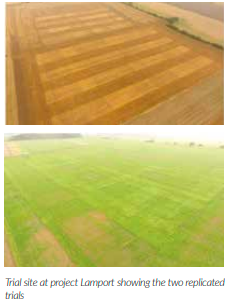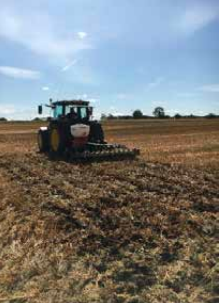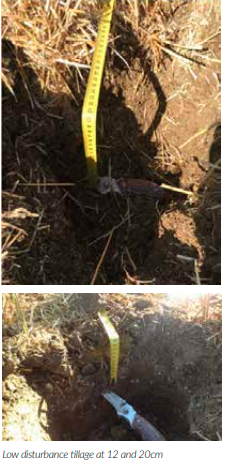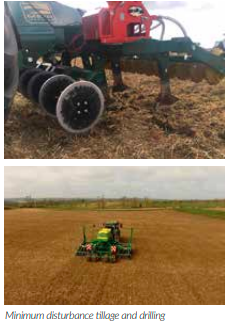Written by David Purdy from John Deere, based on work at Agrovista’s Project Lamport
A project, now in its 7th year, initially developed and managed by industrial partner AGROVISTA to study the cultural control of blackgrass at their flagship Lamport trials site in Northamptonshire used cover crops in conjunction with spring cropping to develop a rotational production system to manage blackgrass populations on heavy soil types. Early observations and successes suggested as well as controlling blackgrass, reducing headcounts from over 500m2 to less than 2m2 for example, the soil also improved as well as maintaining sustainable spring wheat yields. To study these effects further a larger fully replicated trial site has been developed at the same location. The background to the trial focuses and expands on the findings at Lamport along with some of the wider significant challenges and limiting factors on cereal yields and profitability in the UK. These include declining soil organic matter and soil health, soil compaction and obviously grass weed control. After soil organic matter reduction, soil compaction is one of the most damaging factors for plant growth and yield.

As machinery axle weights increase further deeper compaction is inflicted on soils resulting in further subsequent damage. However modern tyre technologies and lighter axle weights can help mitigate the damage. Tillage is used to break up the compaction and restructure soils to enable crop growth and development but often has further damaging effects for example the further loss of soil organic matter with the associated negative effects. Finally, the blackgrass issue has grown out of post emergence herbicide resistance and therefore increasing populations which has made control in winter cropping of cereals more challenging, therefore, spring cereal production systems are often used as a cultural control mechanism to help deal with blackgrass.
The use of cover crops is growing in the UK, however their scientific understanding on the effects on soil health factors, spring cereal crop yields and their part in blackgrass control is limited. This trial using large replicated field trials running from 2018 – 2021 will investigate the effects of low disturbance tillage, different levels of compaction, lower axle weights, modern tyre technologies and cover crops in a spring cereals production system. The overall aim is to understand the combinations of physical treatments with the biological impacts of plant rooting systems of cover crops to improve soil health, ensure resilient yields and control blackgrass in a spring cereal production system, in summary the roots verses iron philosophy, allowing at capture of carbon through photosynthesis to feed the soil food web which in turn delivers gains to soil health.

Two large replicated trials have been established. The first, fully replicated 32 plot experiment, established in 2018 compares the effects of low disturbance tillage at 20cm and zero tillage with the biological effects of cover crop species black oats and phacelia grown both individually and combined.

The second fully replicated 48 plot experiment established in 2019 compares the effects of pre compacting the soil at two different tyre pressures on lower tractor axle weights, low disturbance tillage at two different depths with the biological effects of black oats and phacelia cover crops combined. Along with control plots and replication these trials result in a large 96 (12 metre x 12 metre) plot trial site.

Their effects will be assessed with range of physical and biological measurements including water infiltration rates, soil structure, bulk density, penetrometer resistance, shear forces, organic matter, worm numbers, decomposition rates, mycorrhizal colonisation and yields among others. Were appropriate precision farming technologies such NDVI and telematics are being employed to measure cover crop biomass and fuel consumption.
The objective is to build a production system that improves soil health and in turn resulting spring cereal yields and well as managing blackgrass to low levels. Early results are showing some positive results including,
• Worms are increasing under cover crops but declining under tillage.
• Soil structure and aggregation are improving under cover crops.
• Spring wheat yields are improving after good cover crop biomass production
• Blackgrass control improves after cover crops
• Combinations of cover crop and low disturbance tillage has yield benefits to subsequent spring cereal yields

Along with specialists from Agrovista the project partners include Philip Wright from Wright solutions and well as various specialist machinery providers. The research forms part of a PhD programme at the University of Nottingham. Project Lamport has open days in July where further details and result will be presented